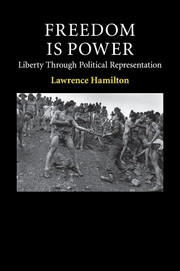Crossref Citations
This Book has been
cited by the following publications. This list is generated based on data provided by Crossref.
Hamilton, Lawrence
2013.
Power, domination and human needs.
Thesis Eleven,
Vol. 119,
Issue. 1,
p.
47.
Hamilton, Lawrence
2013.
The Promise of Political Theory in South Africa.
Politikon,
Vol. 40,
Issue. 3,
p.
517.
Moore, David
2015.
Conflict and After: Primitive Accumulation, Hegemonic Formation and Democratic Deepening.
Stability: International Journal of Security & Development,
Vol. 4,
Issue. 1,
Henao Castro, Andrés Fabián
2017.
The Crack in the Mask, the Wound in the Flesh: Political Representation as Symptom.
Representation,
Vol. 53,
Issue. 1,
p.
55.
Thomassen, Lasse
2017.
Mind the gap: Lawrence Hamilton and aesthetic representation.
Representation,
Vol. 53,
Issue. 1,
p.
41.
Motimele, Moshibudi
2017.
Political representation and non-citizenship: the impact of excluded subjects on democratic frameworks of representation.
Representation,
Vol. 53,
Issue. 1,
p.
67.
Piper, Laurence
2017.
Representing Hamilton.
Representation,
Vol. 53,
Issue. 1,
p.
5.
Hamilton, Lawrence
2017.
Ideas, Powers and Politics.
Theoria,
Vol. 64,
Issue. 150,
Hull, George
2017.
Group Representation, Freedom, and Democracy: Comments on Lawrence Hamilton’s Model of Popular Sovereignty.
Representation,
Vol. 53,
Issue. 1,
p.
25.
Allsobrook, Christopher J.
2017.
Liberty through Political Representation and Rights Recognition.
Theoria,
Vol. 64,
Issue. 150,
Hamilton, Lawrence
2017.
Representation Needs Resistance.
Representation,
Vol. 53,
Issue. 1,
p.
81.
Furner, James
2017.
Some Problems of Political Representation in Lawrence Hamilton’sFreedom is Power.
Representation,
Vol. 53,
Issue. 1,
p.
13.
O'Shea, Tom
2018.
A civic republican analysis of mental capacity law.
Legal Studies,
Vol. 38,
Issue. 1,
p.
147.
Fumagalli, Corrado
2018.
Democratic representation and democratic sanctions.
Representation,
Vol. 54,
Issue. 3,
p.
201.
Bradley, M. Todd
2019.
Response to Allen Dunn’s “Ethics, Identity, and Political Mediation in Right-Wing American Populism”.
Soundings: An Interdisciplinary Journal,
Vol. 102,
Issue. 2-3,
p.
170.
Guasti, Petra
and
Geissel, Brigitte
2019.
Saward’s Concept of the Representative Claim Revisited: An Empirical Perspective.
Politics and Governance,
Vol. 7,
Issue. 3,
p.
98.
Dalaqua, Gustavo H.
2020.
Democratic Representation and Legislative Theatre.
Theoria,
Vol. 67,
Issue. 164,
p.
26.
Evans, Mihail
2020.
The Future of Representative Politics.
Theoria,
Vol. 67,
Issue. 164,
p.
118.
Arlen, Gordon
and
Rossi, Enzo
2021.
Must Realists Be Pessimists About Democracy? Responding to Epistemic and Oligarchic Challenges.
Moral Philosophy and Politics,
Vol. 8,
Issue. 1,
p.
27.
Blachford, Kevin
2021.
The Eurocentrism of neo-Roman republicanism and the neglect of republican empire.
Thesis Eleven,
Vol. 166,
Issue. 1,
p.
136.





